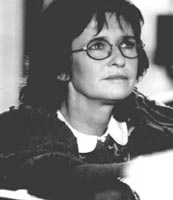
Graciane Finzi was born in Casablanca in 1945.
Her parents, both teachers at the Casablanca Conservatory, instilled in her a love of musicand, while attending the same Conservatory, she attained the level necessary to enter theNational Advanced Music Conservatory in Paris when she was only 10 years old.
While she was there, she followed courses in:
Music theory,
History of music,
Sight-reading, and
Piano, in the class led by Joseph Benvenuti.
When she left the Paris Conservatory a few years later, she had obtained:
First prize in harmony,
First prize in counterpoint,
First prize in fugue,
and First prize in composition.
She has since been awarded:
The Grand Prix for Symphonie Promotion from the SACEM
The Georges Enesco Prize from the SACEM
The S.A.C.D. Prize for her opéra, "Pauvre Assassin".
In 2001, she obtained the S.A.C.E.M. Grand Prix for all her work.
In 2006,"l'Institute de France "awarded her"The Chartier Prize"
In 2013, "Prix Musique SACD"
In 2020, Prix Florent Schmitt by l'Institut de France
Between 1975 and 1979, she was Musical Director of "La Défense Festival."
In 1979, she was appointed FulI Professor at the Paris National Advanced Music Conservatory.
Official Représentative for the French Association for Artistic Action, 1997-2000.Vice-President of the International Society for Contemporary Music.2001: Résident Composer with the Lille National Orchestra.
The works of Graciane Finzi have been played throughout the world by major soloists andorchestras (Paris, New York, London, Rome, Moscow, Helsinki, Vancouver, Nuremburg, Buenos Aires, Cologne, Calgary. Bremen. Rio de Janeiro, Berlin, Madrid, Warsaw, Mexico, Athènes, Barcelone, Santiago du Chili etc...)
During my early period as a composer, l took account of the individuality of different orchestral instruments, bringing them together in juxtaposed groups which each had its own.
Dynamic, impulses, colours and rhythm, thus multiplying what we call in the profession the "true parts".
Nowadays, l have moved towards a more harmonie language, where the multiplicity of soundlevels are organised to form giant harmonies. Poles of attraction form between the notes which guide our understanding of a music which never aims at abstraction, but the immediate expression of life as the deepest feelings of man.
- Can we use the term romanticism? Perhaps. l do not know.
- Expression? Yes, l hope so.- Feelings? Very certainly, that is what l am striving for.
Version Française
